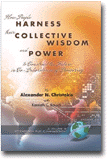
How People Harness Their Collective Wisdom and Power
To Construct the Future in Co-Laboratories of Democracy
Edited by:
Alexander N. Christakis, Institute for 21st Century Agoras
Kenneth C. Bausch
A volume in the series: Research in Public Management. Editor(s): Lawrence R. Jones, Naval Postgraduate School.
Published 2006
We have all experienced the benefits of dialogue when we openly and thoughtfully confront issues. We have also experienced the frustration of interminable discussion that does not lead to progress. Co-Laboratories of Democracy enable large, diverse groups to dialogue and generate positive results. Many group processes engender enthusiasm and good feeling as people share their concerns and hopes with each other. Co-Laboratories go beyond this initial euphoria to:
Discover root causes; Adopt consensual action plans; Develop teams dedicated to implementing those plans; and Generate lasting bonds of respect, trust, and cooperation.Co-Laboratories achieve these results by respecting the autonomy of all participants, and utilizing an array of consensus tools including discipline, technology and graphics that allow the stakeholders to control the discussion. These are explained in depth in a book authored by Alexander N. Christakis with Kenneth C. Bausch: Co-Laboratories of Democracy: How People Harness Their Collective Wisdom to Create the Future (Information Age, 2006).Co-Laboratories are a refinement of Interactive Management, a decision and design methodology developed over the past 30 years to deal with very complex situations involving diverse stakeholders. It has been successfully employed all over the world in situations of uncertainty and conflict. On Cyprus, for example, it has been used to bridge the divide between the Turkish and Greek factions on the island. It is currently being employed on that island to help Palestinian authorities organize their government.Co-Laboratories in one day can draw together a diverse group of people on an issue, elicit authentic feelings and respectful listening, generate agreed upon language, and identify leverage points for effective action. Participants will be able to generate a consensual action plan. Co-Laboratories generate real respect, understanding, and cooperation among participants and do it rapidly.
REVIEWS
"This book explores and encourages the use of the SDP (Structured Design Process) for generating dialogue as a means of activating participatory democracy. ... The authors’ own strong commitments to making SDP become more widely practised pervades their book, which is an invitation/exhortation to create more examples of this approach in practice (through following carefully the principles and guidelines for practice as supplied).
In my view, the book does successfully engage the reader to wish to 'try out' the approach in practice and hence to set more examples of its workability. I strongly recommend that it be read and used by people concerned with ways of developing 'participatory democracy'." Norma R.A. Romm University of South Africa
"In exceptionally complex design challenges, there is little doubt that considerable skill is involved in getting the group to achieve its endpoint. For this reason, readers will appreciate that SDP is not a magic bullet appropriate for all targets. It is a high power technology appropriate for special applications. Readers will recognize from the examples provided where SDP makes its most powerful contributions to framing the context for collaborative action. Even without a formal analysis of situational complexity, experienced practitioners will recognize that there is a time and a place for SDP. Dr. Christakis illustrates that for many of our communities' most pressing social problems, the time for confidently applying SDP is now." Tom Flanagan, Ph.D., MBA University of Massachusetts, Boston
-
Paperback978-1-59311-481-7
Web price: $45.04 (Reg. 52.99)
-
Hardcover978-1-59311-482-4
Web price: $80.74 (Reg. 94.99)
- eBook9781607526926

- BUS071000 - BUSINESS & ECONOMICS: Leadership
- BUS041000 - BUSINESS & ECONOMICS: Management
- BUS035000 - BUSINESS & ECONOMICS: INTERNATIONAL: General
-
 Arming America at War
A Model for Rapid Defense Acquisition in Time of War
Arming America at War
A Model for Rapid Defense Acquisition in Time of War
-
 Financing National Defense
Policy and Process
Financing National Defense
Policy and Process
-
 Governing Fables
Learning from Public Sector Narratives
Governing Fables
Learning from Public Sector Narratives
-
 Outcome-Oriented Public Management
A Responsibility-Based Approach to the New Public Management
Outcome-Oriented Public Management
A Responsibility-Based Approach to the New Public Management
-
 The Legacy of June Pallot
Public Sector Financial Management Reform
The Legacy of June Pallot
Public Sector Financial Management Reform
-
 Trust and Governance Institutions
Asian Experiences
Trust and Governance Institutions
Asian Experiences
-
 Why did Anticorruption Policy Fail?
A Study of Anticorruption Policy Implementation Failure in Indonesia
Why did Anticorruption Policy Fail?
A Study of Anticorruption Policy Implementation Failure in Indonesia

